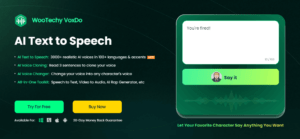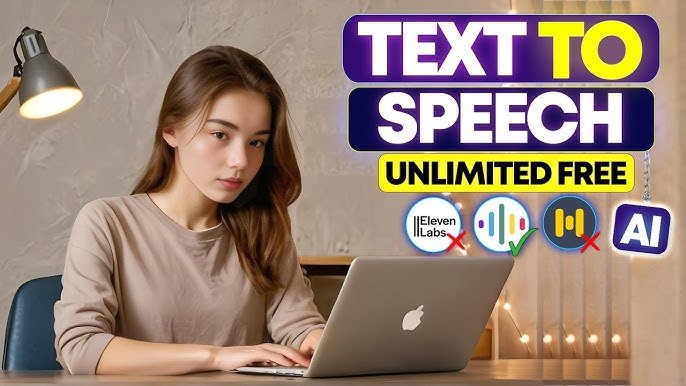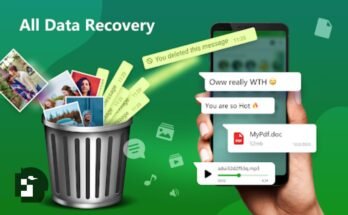In recent years, advancements in artificial intelligence (AI) have revolutionized how we interact with technology. One notable innovation is text-to-speech (TTS) and AI voice generator tools. These tools enable users to convert written text into spoken words, making technology more accessible and user-friendly. From content creators and educators to businesses and individuals with special needs, TTS and AI voice generators are transforming how we communicate and engage with digital content.
This article explores the concept of Free Text To Speech & AI Voice Generators, how they work, their features, benefits, drawbacks, alternatives, and their overall value in today’s tech-driven world.
What is Free Text To Speech & AI Voice Generator?
Free Text To Speech (TTS) and AI Voice Generators are software solutions that utilize artificial intelligence to convert written text into realistic human-like speech. These tools rely on natural language processing (NLP) and machine learning to mimic human intonation, accents, and speaking styles.

AI voice generators go beyond simple TTS functionality by allowing users to customize voices, generate various tones, and even create unique synthetic voices for branding purposes. Many platforms offer free versions of these tools, making them accessible to individuals, small businesses, and hobbyists who may not have the budget for premium services.
These tools have applications in several domains, including:
- Content creation for podcasts, YouTube videos, and audiobooks.
- Accessibility for individuals with visual impairments or reading difficulties.
- Customer support via voice bots and IVR (Interactive Voice Response) systems.
- Educational tools, including interactive e-learning modules and audiobooks.
How Free Text To Speech & AI Voice Generators Work
Free TTS and AI Voice Generators function by processing written input and converting it into audio output through several key steps:
1. Text Input
Users provide the text they want to convert into speech. This can be done by typing or uploading a file, such as a document or script.
2. Text Analysis
The software breaks down the input into smaller linguistic units, analyzing sentence structure, punctuation, and context to ensure proper pronunciation and flow.
3. Phoneme Mapping
Using phonetic algorithms, the software converts written words into phonemes—the basic sound units of speech.
4. Voice Synthesis
The software assigns the phonemes to a pre-trained voice model. These models are based on recordings of real human voices, enhanced with AI to sound natural and expressive.
5. Audio Output
Finally, the synthesized speech is generated as an audio file. Users can download the file in various formats, such as MP3 or WAV, for further use.
Advanced AI voice generators allow users to adjust pitch, speed, and tone, or even clone specific voices for a customized experience.
Features of Free Text To Speech & AI Voice Generator
1. Realistic Voice Output
State-of-the-art TTS tools use deep learning to produce lifelike speech that mimics human emotion, intonation, and natural pauses.
2. Multi-Language Support
Many platforms support multiple languages and regional accents, making them ideal for global users and businesses.
3. Customizable Voices
Some tools allow users to modify voices by adjusting pitch, speed, or tone, or by creating custom synthetic voices tailored to their brand or project.
4. Ease of Use
Free TTS platforms often have intuitive interfaces, enabling users to quickly input text and generate speech without technical expertise.
5. Audio Export Options
Generated audio files can typically be downloaded in various formats, such as MP3 or WAV, for versatile use across platforms.
6. Cloud-Based Functionality
Most tools are cloud-based, eliminating the need for software installation and enabling access from any device with an internet connection.
7. Integration Capabilities
Advanced platforms offer API integrations, allowing businesses to integrate TTS functionality into their apps, websites, or customer service systems.
8. Batch Processing
Some tools allow users to process large volumes of text at once, saving time for bulk content creation.
9. Accessibility Features
TTS tools enhance accessibility for individuals with visual impairments, dyslexia, or other conditions that make reading difficult.
10. Cost-Efficiency
Free versions of TTS tools provide essential functionalities without requiring a financial investment, making them accessible to everyone.
Pros of Free Text To Speech & AI Voice Generator
| Pros | Description |
|---|---|
| Accessibility | Makes digital content accessible to individuals with disabilities, including visual impairments. |
| Time-Saving | Converts text to speech in seconds, saving time for content creators and businesses. |
| Cost-Effective | Free versions offer valuable functionality without financial investment. |
| Global Reach | Multi-language support enables content delivery to diverse audiences worldwide. |
| Realistic Voices | Produces natural-sounding voices that enhance user engagement and professionalism. |
| Customization | Allows users to modify voice pitch, tone, and speed for tailored outputs. |
| Cloud-Based Access | No installation required; accessible from any device with internet connectivity. |
| Scalable | Batch processing and API integrations make these tools suitable for individual and enterprise use. |
Cons of Free Text To Speech & AI Voice Generator
| Cons | Description |
|---|---|
| Limited Features in Free Versions | Free tools often lack advanced customization and premium voice options. |
| Monotony in Long Texts | Even the most realistic voices may sound monotonous in lengthy content. |
| Internet Dependency | Requires a stable internet connection for cloud-based platforms. |
| Data Privacy Concerns | Uploading text to cloud-based tools may raise security and privacy issues. |
| Inconsistent Pronunciation | May mispronounce uncommon words, technical terms, or names. |
| Usage Restrictions | Free versions may have character limits or restricted commercial use. |
| Voice Cloning Misuse | Advanced voice cloning features could potentially be misused for unethical purposes. |
Free Text To Speech & AI Voice Generator Alternatives
| Alternative | Description |
|---|---|
| Google Text-to-Speech | Free TTS tool integrated into Android devices with multi-language support. |
| Amazon Polly | Cloud-based TTS service offering lifelike voices and advanced features, including voice customization. |
| Microsoft Azure TTS | Enterprise-grade TTS solution with a wide range of natural-sounding voices and APIs. |
| NaturalReader | User-friendly TTS software for personal and professional use, with free and paid versions. |
| Balabolka | Free TTS desktop application for Windows with extensive customization options. |
| iSpeech | Online TTS tool offering a mix of free and premium features for personal and business use. |
| IBM Watson Text to Speech | AI-powered TTS service with advanced voice synthesis and integration capabilities. |
| Speechify | TTS app designed for productivity, enabling users to listen to documents, emails, and articles. |
Conclusion and Verdict on Free Text To Speech & AI Voice Generator
Free Text To Speech & AI Voice Generators have proven to be indispensable tools for personal and professional use. They democratize access to advanced voice synthesis technology, enabling content creators, businesses, and individuals to generate high-quality audio content effortlessly.
While free versions of these tools may have certain limitations, they offer a cost-effective entry point into the world of TTS and AI voice generation. For those seeking more advanced features, premium options or enterprise-grade alternatives can provide enhanced functionality and greater flexibility.
Overall, these tools represent a significant leap in making technology more accessible and user-friendly, with broad applications across various industries and demographics.
FAQs Free Text To Speech & AI Voice Generator
1. What is the difference between free and premium TTS tools?
Free tools offer basic functionalities, such as limited voice options and character limits, while premium versions provide advanced features like voice customization, commercial usage rights, and API integrations.
2. Can TTS tools be used for commercial purposes?
Some free TTS tools allow limited commercial use, but most require a premium subscription for unrestricted usage in commercial projects.
3. Are there offline TTS tools available?
Yes, tools like Balabolka and NaturalReader offer offline functionality, which can be useful in areas with limited internet connectivity.
4. How secure are TTS tools for sensitive text?
Security varies by platform. Look for tools with strong privacy policies and encryption if handling sensitive or confidential text.
5. Can TTS tools mimic specific voices?
Advanced TTS tools with voice cloning features can mimic specific voices, but this feature is typically available only in premium versions.



